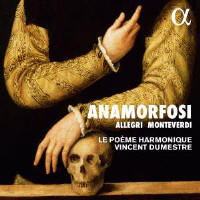Texte paru dans: / Appeared in: |
|
|
Reviewer: Raymond
Tuttle
This CD could do for Allegri’s
Miserere what the Tallis Scholars’ Gimell recording did for it four decades
ago. The Tallis Scholars were not the first to record it, of course, nor
will Dumestre be the last, but I do think this new version presents the
music in such a radical way that it will be a game-changer. In his brief
booklet note, Dumestre writes about being haunted by this work for 25 years.
Now it is our turn to be haunted, at least for another quarter-century. The Tallis Scholars presented the Miserere as a work of surpassing, soaring purity and consonance. Each time soprano Alison Stamp reached a high C, we were transfixed as if we were in the presence of the Lord himself. However, what the Tallis Scholars recorded appears to have been a simplified, unembellished version inconsistent with period style, although we have to thank none other than the teenaged Mozart that we have the music at all. Dumestre’s performance is based on evidence that, during Allegri’s time and after, the music would have been embellished and ornamented, not to show off the singers’ prowess but to illustrate the anguish of sinning mankind. And so, what the Tallis Scholars made pure, Dumestre’s forces have made, pardon me for saying this, dirty again. Melismatic writing, sometimes overlap-ping multiple parts, creates an atmosphere of restless intensity; and, especially as the work comes close to the end, there are some toe-curling dissonances. In its way, this is no less beautiful than the Tallis Scholars’ recording, but it is a lot less “nice.” I won’t get rid of my Gimell CD, but this new version goes right next to it on top of the pile.
The rest of the program is no
climb-down. The very next work is Luigi Rossi’s Un allato messagier, an
agonized response to the death of Christ, as relayed by a winged messenger
to Mary Magdalene. The fact that this music originated as a Lament of the
Queen of Sweden on the death of her husband matters not one bit. This
10-minute work is more an operatic scena than a sacred cantata, and alto Eva
Zaïcik gives it such a blistering intensity that everything else stops dead
in its tracks. The tension never lets up, yet, to paraphrase the title of
one of Monteverdi’s works, “It hurts so good.” (Actually, it is “So sweet is
the torment,” but allow me a little poetic license, please!) Maestro
Anonymous’s work includes ear-blowing dissonances in its final section to
illustrate the words “I am afflicted and humbled exceedingly,” and one can
find examples of gloriously painful music mirroring painful emotions
throughout this program. I went through a Monteverdi period in my 20s, but I think I lost some of my interest in his music after being overexposed to too many correcter-than-thou English performances in which every “t” was crossed and every “i” dotted, yet somehow the passion and the pain fell out of the bottom like a leaky sieve. I am thinking that my feelings about Monte-verdi would have been different today if I had heard more performances like these, which crackle with operatic drama while not sacrificing style and accuracy. Dumestre has assembled an outstanding team of singers here. (Please record Monteverdi’s madrigals now!) By saying that, I don’t mean to minimize the contributions of the instrument-alists—by the way, Dumestre’s theorbo playing (theorbism?) is gorgeous—because their passion is not less than the singers’. As I write this, 2019 is drawing to a close, and I can say with honesty that I have not heard a CD of Baroque music that has moved me more this year, with the exception of Jakub Józef Orliński’s debut CD (Anima Sacra) on Erato. That disc, because it came early in the year, was on my 2019 Want List. Anamorfosi, coming late in the year, will be on my 2020 Want List.
| |
|
|
|
|
|
|
|
Cliquez l'un ou l'autre
bouton pour découvrir bien d'autres critiques de CD |
|




